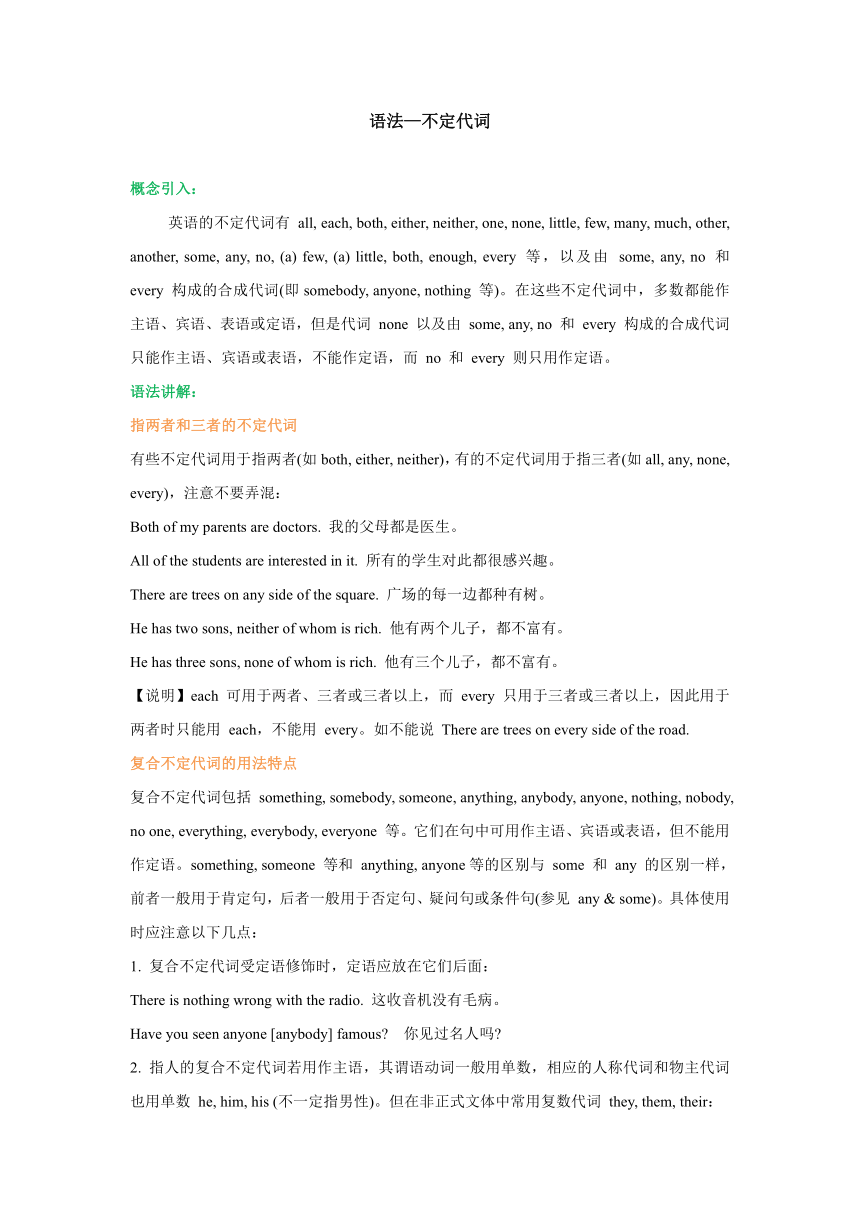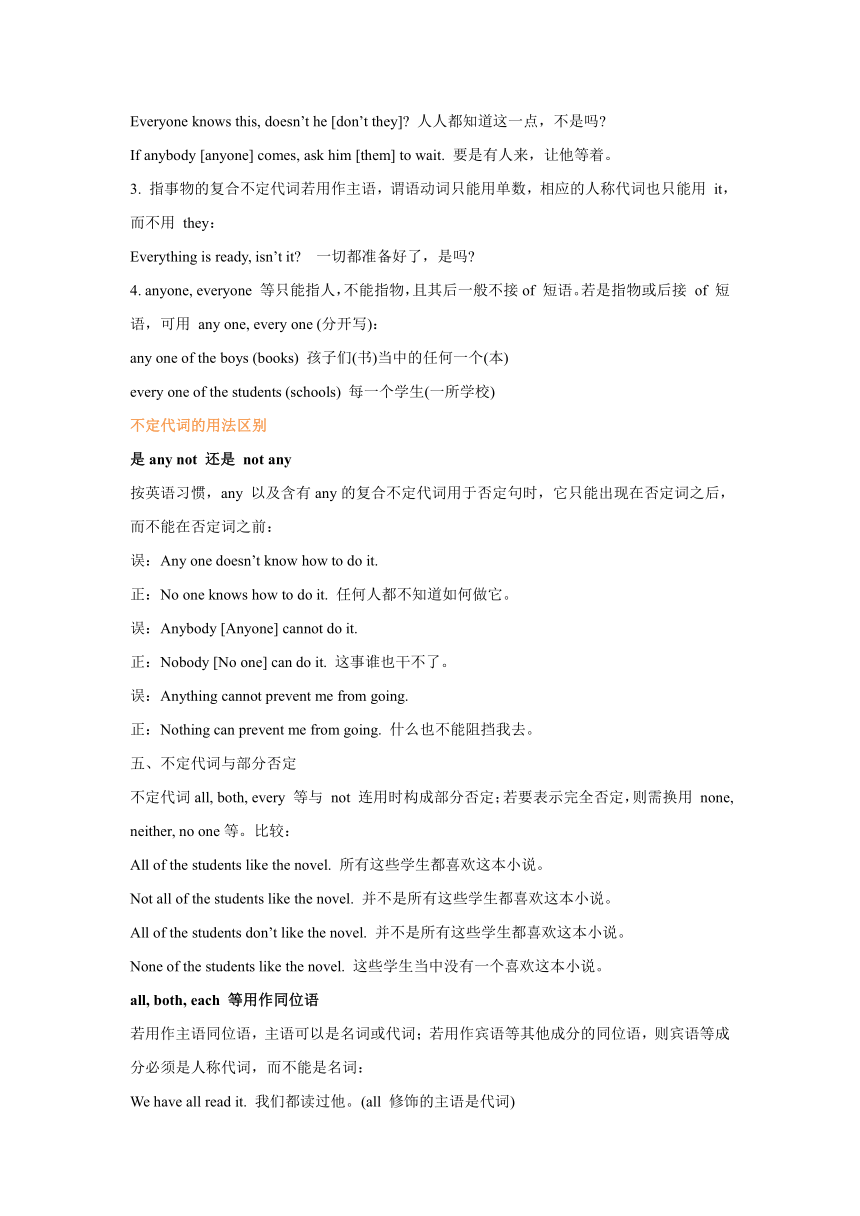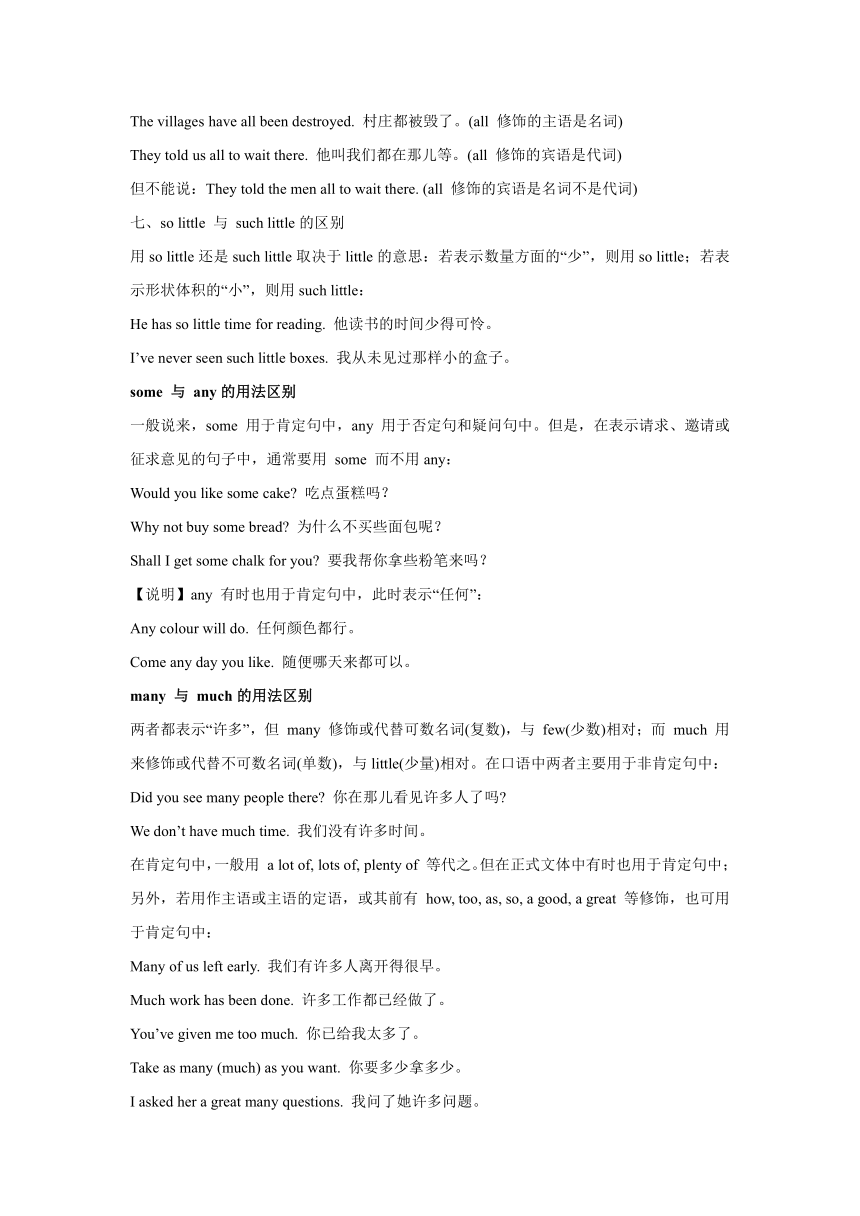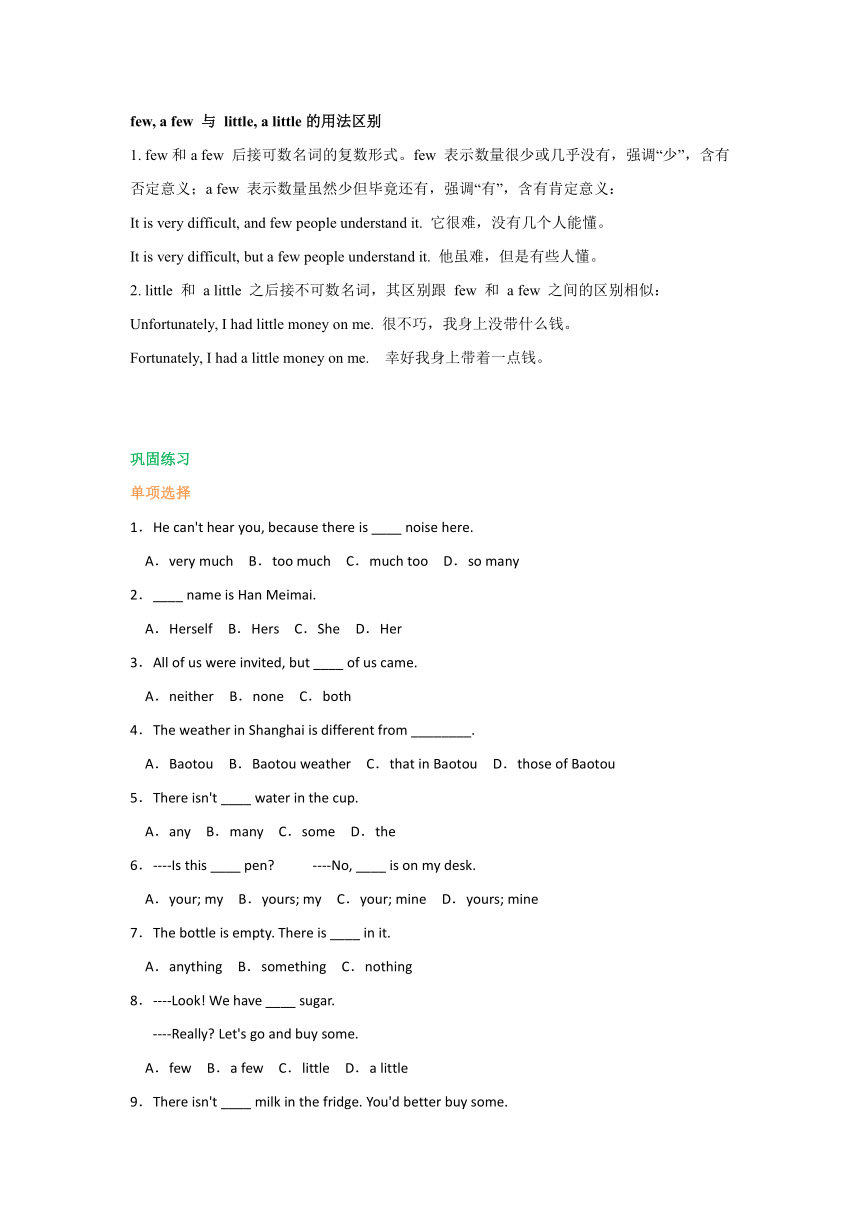北师大版高中英语模块4 Unit 10 Money 语法:不定代词
文档属性
| 名称 | 北师大版高中英语模块4 Unit 10 Money 语法:不定代词 |

|
|
| 格式 | zip | ||
| 文件大小 | 26.0KB | ||
| 资源类型 | 教案 | ||
| 版本资源 | 北师大版 | ||
| 科目 | 英语 | ||
| 更新时间 | 2019-11-10 00:00:00 | ||
图片预览




文档简介
语法—不定代词
概念引入:
英语的不定代词有 all, each, both, either, neither, one, none, little, few, many, much, other, another, some, any, no, (a) few, (a) little, both, enough, every 等,以及由 some, any, no 和 every 构成的合成代词(即somebody, anyone, nothing 等)。在这些不定代词中,多数都能作主语、宾语、表语或定语,但是代词 none 以及由 some, any, no 和 every 构成的合成代词只能作主语、宾语或表语,不能作定语,而 no 和 every 则只用作定语。
语法讲解:
指两者和三者的不定代词
有些不定代词用于指两者(如both, either, neither),有的不定代词用于指三者(如all, any, none, every),注意不要弄混:
Both of my parents are doctors. 我的父母都是医生。
All of the students are interested in it. 所有的学生对此都很感兴趣。
There are trees on any side of the square. 广场的每一边都种有树。
He has two sons, neither of whom is rich. 他有两个儿子,都不富有。
He has three sons, none of whom is rich. 他有三个儿子,都不富有。
【说明】each 可用于两者、三者或三者以上,而 every 只用于三者或三者以上,因此用于两者时只能用 each,不能用 every。如不能说 There are trees on every side of the road.
复合不定代词的用法特点
复合不定代词包括 something, somebody, someone, anything, anybody, anyone, nothing, nobody, no one, everything, everybody, everyone 等。它们在句中可用作主语、宾语或表语,但不能用作定语。something, someone 等和 anything, anyone等的区别与 some 和 any 的区别一样,前者一般用于肯定句,后者一般用于否定句、疑问句或条件句(参见 any & some)。具体使用时应注意以下几点:
1. 复合不定代词受定语修饰时,定语应放在它们后面:
There is nothing wrong with the radio. 这收音机没有毛病。
Have you seen anyone [anybody] famous? 你见过名人吗?
2. 指人的复合不定代词若用作主语,其谓语动词一般用单数,相应的人称代词和物主代词也用单数 he, him, his (不一定指男性)。但在非正式文体中常用复数代词 they, them, their:
Everyone knows this, doesn’t he [don’t they]? 人人都知道这一点,不是吗?
If anybody [anyone] comes, ask him [them] to wait. 要是有人来,让他等着。
3. 指事物的复合不定代词若用作主语,谓语动词只能用单数,相应的人称代词也只能用 it,而不用 they:
Everything is ready, isn’t it? 一切都准备好了,是吗?
4. anyone, everyone 等只能指人,不能指物,且其后一般不接of 短语。若是指物或后接 of 短语,可用 any one, every one (分开写):
any one of the boys (books) 孩子们(书)当中的任何一个(本)
every one of the students (schools) 每一个学生(一所学校)
不定代词的用法区别
是any not 还是 not any
按英语习惯,any 以及含有any的复合不定代词用于否定句时,它只能出现在否定词之后,而不能在否定词之前:
误:Any one doesn’t know how to do it.
正:No one knows how to do it. 任何人都不知道如何做它。
误:Anybody [Anyone] cannot do it.
正:Nobody [No one] can do it. 这事谁也干不了。
误:Anything cannot prevent me from going.
正:Nothing can prevent me from going. 什么也不能阻挡我去。
五、不定代词与部分否定
不定代词all, both, every 等与 not 连用时构成部分否定;若要表示完全否定,则需换用 none, neither, no one等。比较:
All of the students like the novel. 所有这些学生都喜欢这本小说。
Not all of the students like the novel. 并不是所有这些学生都喜欢这本小说。
All of the students don’t like the novel. 并不是所有这些学生都喜欢这本小说。
None of the students like the novel. 这些学生当中没有一个喜欢这本小说。
all, both, each 等用作同位语
若用作主语同位语,主语可以是名词或代词;若用作宾语等其他成分的同位语,则宾语等成分必须是人称代词,而不能是名词:
We have all read it. 我们都读过他。(all 修饰的主语是代词)
The villages have all been destroyed. 村庄都被毁了。(all 修饰的主语是名词)
They told us all to wait there. 他叫我们都在那儿等。(all 修饰的宾语是代词)
但不能说:They told the men all to wait there. (all 修饰的宾语是名词不是代词)
七、so little 与 such little的区别
用so little还是such little取决于little的意思:若表示数量方面的“少”,则用so little;若表示形状体积的“小”,则用such little:
He has so little time for reading. 他读书的时间少得可怜。
I’ve never seen such little boxes. 我从未见过那样小的盒子。
some 与 any的用法区别
一般说来,some 用于肯定句中,any 用于否定句和疑问句中。但是,在表示请求、邀请或征求意见的句子中,通常要用 some 而不用any:
Would you like some cake? 吃点蛋糕吗?
Why not buy some bread? 为什么不买些面包呢?
Shall I get some chalk for you? 要我帮你拿些粉笔来吗?
【说明】any 有时也用于肯定句中,此时表示“任何”:
Any colour will do. 任何颜色都行。
Come any day you like. 随便哪天来都可以。
many 与 much的用法区别
两者都表示“许多”,但 many 修饰或代替可数名词(复数),与 few(少数)相对;而 much 用来修饰或代替不可数名词(单数),与little(少量)相对。在口语中两者主要用于非肯定句中:
Did you see many people there? 你在那儿看见许多人了吗?
We don’t have much time. 我们没有许多时间。
在肯定句中,一般用 a lot of, lots of, plenty of 等代之。但在正式文体中有时也用于肯定句中;另外,若用作主语或主语的定语,或其前有 how, too, as, so, a good, a great 等修饰,也可用于肯定句中:
Many of us left early. 我们有许多人离开得很早。
Much work has been done. 许多工作都已经做了。
You’ve given me too much. 你已给我太多了。
Take as many (much) as you want. 你要多少拿多少。
I asked her a great many questions. 我问了她许多问题。
few, a few 与 little, a little的用法区别
1. few和a few 后接可数名词的复数形式。few 表示数量很少或几乎没有,强调“少”,含有否定意义;a few 表示数量虽然少但毕竟还有,强调“有”,含有肯定意义:
It is very difficult, and few people understand it. 它很难,没有几个人能懂。
It is very difficult, but a few people understand it. 他虽难,但是有些人懂。
2. little 和 a little 之后接不可数名词,其区别跟 few 和 a few 之间的区别相似:
Unfortunately, I had little money on me. 很不巧,我身上没带什么钱。
Fortunately, I had a little money on me. 幸好我身上带着一点钱。
巩固练习
单项选择
1.He can't hear you, because there is ____ noise here.
A.very much B.too much C.much too D.so many
2.____ name is Han Meimai.
A.Herself B.Hers C.She D.Her
3.All of us were invited, but ____ of us came.
A.neither B.none C.both
4.The weather in Shanghai is different from ________.
A.Baotou B.Baotou weather C.that in Baotou D.those of Baotou
5.There isn't ____ water in the cup.
A.any B.many C.some D.the
6.----Is this ____ pen? ----No, ____ is on my desk.
A.your; my B.yours; my C.your; mine D.yours; mine
7.The bottle is empty. There is ____ in it.
A.anything B.something C.nothing
8.----Look! We have ____ sugar.
----Really? Let's go and buy some.
A.few B.a few C.little D.a little
9.There isn't ____ milk in the fridge. You'd better buy some.
A.no B.any C.some
10.----“There isn't ____ water here. Could you get ____ for me?”
----“All right.”
A.some; some B.any; any C.some; any D.any; some
11.Today, ____ trees are still being cut down somewhere in the world.
A.much too B.too much C.many too D.too many
12.There are lots of English books here, and ____ of them is easy to understand.
A.both B.all C.every D.each
13.Mr. Green taught ____ English last year.
A.our B.we C.us
14.These sweaters are too small for me. Please show me ____ one.
A.other B.others C.the others D.another
15.Mary can't go with us. ____ has to look after ____ mother at home.
A.She; his B.She; her C.He; her D.He; His
16.I often help ____ .
A.he or she B.his and her C.him and her D.his and hers
17.There are some trees on ____ side of the street.
A.both B.all C.either D.every
18.“Which of the two dictionaries do you like better?”“I like ____ , because they're not useful.”
A.both B.either C.all D.neither
19.They were all very tired, but ____ of them would stop to take a rest.
A.any B.some C.none D.neither
20.There were ____ people and ______noise in the park last Sunday.
A.many; much B.much; much C.much; many D.many; many
21.____ of them has a dictionary and ____ one of them can look up words in the dictionary.
A.Each; every B.Every; each C.Each; each D.Every; every
22.Please keep together. We want ____ of you to get lost.
A.none B.some C.many D.any
23.There is ____ water here; but there are quite ____ empty glasses.
A.little; a few B.few; little C.few; a few D.little; a little
24.The skirt is ____ . She made it ____ .
A.hers; herself B.her; herself C.herself; hers D.herself; her
25.“Haven't you forgotten ____ ?”“ ____ ,oh, I forgot my bag.”
A.anything; Excuse me B.something; Excuse me
C.something; Pardon D.everything; Pardon
26.Be quiet! I have ____ to tell you.
A.important anything B.anything important
C.important something D.something important
27.My father is very busy with his work. He has ____ time to do the housework.
A.little B.few C.a little D.a few
28.---- ____ of the boys in Class Four are playing games.
A.All B.Each C.The both D.None
29.The boy promised ____ mother never to lie to ____ again.
A.his; him B.her; her C.her; him D.his; her
30.“Would you like some milk in your tea?”“Yes, just ____ .”
A.much B.a little C.a few D.little
31.Put it down, Richard. You mustn't read ____ letter.
A.anyone's else's B.anyone's else C.anyone else's D.anyone else
32.He found ____ very interesting to ride a horse.
A.this B.that C.it D.which
33.Han Meimei, what about ____ to eat?
A.everything B.something C.nothing D.anything
34.“Help ____ to some meat, Mary,” my aunt said to me.
A.themselves B.ourselves C.yourself D.himself
35.There are twenty teachers in this grade.Eight of them are women teachers and ____ are men teachers.
A.the other B.the others C.others D.other
答案与解析:
单项选择
1.B.too much只能修饰不可数名词, much too 修饰形容词或副词, very much可修饰动词;many只能修饰可数名词,不能修饰不可数名词。
2.D.her作物主代词,意为“她的”,注意her还可作she的宾格。
3.B.句意:“我们都接到邀请,但我们谁没来。”none是all的反义词,表示“(三者以上的)没有一个(人或物)。”
4.C.that作为代词。代替主语 weather. A项错误在于Baotou与前面的主语 weather不相对应,无法比较。代词that既可代替不可数名词,也可代替单数可数名词。
5.A.any用于疑问句和否定句,some用于肯定句。
6.C.your是形容词性物主代词,只能作定语修饰名词; mine是名词性物主代词,可作主语、表语和宾语,但不能作定语。
7.C.空白处填nothing是与前一句的 empty相呼应、吻合的。
8.C.从后一句“去买些糖”可知“糖不多了”。little的意思是“少”,有否定含义,只能修饰不可数名词, a little是“一点”,有肯定含义。few和a few是修饰或代替可数名词,前者否定,后者肯定。
9.B.肯定句中用some,疑问句和否定句中用any。
10.D.前一句是否定句,故用any ;后一句是说话者恳请别人做某事,希望对方同意,并认为对方能同意,故用some。
11.D.too much只能修饰不可数名词,too many只修饰可数名词;A项只修饰形容词或副词;C项本身就是错误的。
12.D.every和each都作“每一个”讲,但every只能作定语;each既可作定语,还可作主语、宾语、同位语等成分。both和all作主语(代替可数名词),谓语动词应用复数。
13.C.代词作宾语应用标本宾格,us是we的宾格。
14.D.other意为“别的、其它的”,可修饰单数名词,也可修饰复数名词。others表示“别人”或“别的事物”,是泛指的复数概念。the other是特指的“其余的(人或物)”。another是泛指的“另一个(人或物)。”
15.B.She在句中作主语,故用主格,her作物主代词。
16.C.代词作宾语应用宾格。
17.C.此处的either可换用each; both后修饰复数名词。
18.D.后一个分句说“没有用”,当然是“两个都不喜欢。”
19.C.前一句说“她们都累了”,后一句说“他们都不愿停下来休息”,故填none.
20.A.“人多(many)”故然“噪音大(much)”。
21.A.each可作主语,而every不能,故第一空填each。every 和each 都不可作定语,但every强调全体,而each强调“个体”,故第二空填every。
22.A.前一句说“让大家靠近些”。后一句是说希望大家谁也不要掉队,故用none。
23.A.前一空填little,表示“水很少”.第二空填a few,修饰可数名词 glasses,注意quite a few的意思是“好几个”。24.A.注意第二句中的herself意为“亲自”。
25.A.乙方说“Excuse me”,是表示他正在查点他的东西。
26.D.形容词修饰something、anything之类的复合不定代词应后置。
27.A.“我的父亲”忙于工作,故几乎没有时间做家务,故用little.
28.A.填all,表示“所有的男孩”都在做游戏。B项的each作主语,are应改为is。C项本身就是错的,the不能放在both前。因为此句没有表示否定含义(即选none的条件),故不能选之。
29.D.句意:“那个男孩向他妈妈许诺再也不对她撒谎了。”promise sb.(never) to do sth.向某人许诺(永远不)做某事了。 lie to sb.对某人撒谎。
30.B.just a little只来一点;just a few只有几个.
31.C.此题考查else的所有格形式,else修饰复合不定代词需后置,其所有格形式是在else后加’s,因此在anyone后加’s是没有道理的。
32.C.it 做形式宾语,代替在句尾作真正宾语的不定式短语to ride a horse,very interesting是形容词短语作宾语补足语。注意此句型结构:“find+it+名词/形容词/分词+to do sth.
”33.B.用something表示邀请。如用 anything则非邀请,而是单纯的询问。
34.C.yourself与后面的me相对应。
35.B,除了八位女教师之外的“余者(the others)”是男教师
概念引入:
英语的不定代词有 all, each, both, either, neither, one, none, little, few, many, much, other, another, some, any, no, (a) few, (a) little, both, enough, every 等,以及由 some, any, no 和 every 构成的合成代词(即somebody, anyone, nothing 等)。在这些不定代词中,多数都能作主语、宾语、表语或定语,但是代词 none 以及由 some, any, no 和 every 构成的合成代词只能作主语、宾语或表语,不能作定语,而 no 和 every 则只用作定语。
语法讲解:
指两者和三者的不定代词
有些不定代词用于指两者(如both, either, neither),有的不定代词用于指三者(如all, any, none, every),注意不要弄混:
Both of my parents are doctors. 我的父母都是医生。
All of the students are interested in it. 所有的学生对此都很感兴趣。
There are trees on any side of the square. 广场的每一边都种有树。
He has two sons, neither of whom is rich. 他有两个儿子,都不富有。
He has three sons, none of whom is rich. 他有三个儿子,都不富有。
【说明】each 可用于两者、三者或三者以上,而 every 只用于三者或三者以上,因此用于两者时只能用 each,不能用 every。如不能说 There are trees on every side of the road.
复合不定代词的用法特点
复合不定代词包括 something, somebody, someone, anything, anybody, anyone, nothing, nobody, no one, everything, everybody, everyone 等。它们在句中可用作主语、宾语或表语,但不能用作定语。something, someone 等和 anything, anyone等的区别与 some 和 any 的区别一样,前者一般用于肯定句,后者一般用于否定句、疑问句或条件句(参见 any & some)。具体使用时应注意以下几点:
1. 复合不定代词受定语修饰时,定语应放在它们后面:
There is nothing wrong with the radio. 这收音机没有毛病。
Have you seen anyone [anybody] famous? 你见过名人吗?
2. 指人的复合不定代词若用作主语,其谓语动词一般用单数,相应的人称代词和物主代词也用单数 he, him, his (不一定指男性)。但在非正式文体中常用复数代词 they, them, their:
Everyone knows this, doesn’t he [don’t they]? 人人都知道这一点,不是吗?
If anybody [anyone] comes, ask him [them] to wait. 要是有人来,让他等着。
3. 指事物的复合不定代词若用作主语,谓语动词只能用单数,相应的人称代词也只能用 it,而不用 they:
Everything is ready, isn’t it? 一切都准备好了,是吗?
4. anyone, everyone 等只能指人,不能指物,且其后一般不接of 短语。若是指物或后接 of 短语,可用 any one, every one (分开写):
any one of the boys (books) 孩子们(书)当中的任何一个(本)
every one of the students (schools) 每一个学生(一所学校)
不定代词的用法区别
是any not 还是 not any
按英语习惯,any 以及含有any的复合不定代词用于否定句时,它只能出现在否定词之后,而不能在否定词之前:
误:Any one doesn’t know how to do it.
正:No one knows how to do it. 任何人都不知道如何做它。
误:Anybody [Anyone] cannot do it.
正:Nobody [No one] can do it. 这事谁也干不了。
误:Anything cannot prevent me from going.
正:Nothing can prevent me from going. 什么也不能阻挡我去。
五、不定代词与部分否定
不定代词all, both, every 等与 not 连用时构成部分否定;若要表示完全否定,则需换用 none, neither, no one等。比较:
All of the students like the novel. 所有这些学生都喜欢这本小说。
Not all of the students like the novel. 并不是所有这些学生都喜欢这本小说。
All of the students don’t like the novel. 并不是所有这些学生都喜欢这本小说。
None of the students like the novel. 这些学生当中没有一个喜欢这本小说。
all, both, each 等用作同位语
若用作主语同位语,主语可以是名词或代词;若用作宾语等其他成分的同位语,则宾语等成分必须是人称代词,而不能是名词:
We have all read it. 我们都读过他。(all 修饰的主语是代词)
The villages have all been destroyed. 村庄都被毁了。(all 修饰的主语是名词)
They told us all to wait there. 他叫我们都在那儿等。(all 修饰的宾语是代词)
但不能说:They told the men all to wait there. (all 修饰的宾语是名词不是代词)
七、so little 与 such little的区别
用so little还是such little取决于little的意思:若表示数量方面的“少”,则用so little;若表示形状体积的“小”,则用such little:
He has so little time for reading. 他读书的时间少得可怜。
I’ve never seen such little boxes. 我从未见过那样小的盒子。
some 与 any的用法区别
一般说来,some 用于肯定句中,any 用于否定句和疑问句中。但是,在表示请求、邀请或征求意见的句子中,通常要用 some 而不用any:
Would you like some cake? 吃点蛋糕吗?
Why not buy some bread? 为什么不买些面包呢?
Shall I get some chalk for you? 要我帮你拿些粉笔来吗?
【说明】any 有时也用于肯定句中,此时表示“任何”:
Any colour will do. 任何颜色都行。
Come any day you like. 随便哪天来都可以。
many 与 much的用法区别
两者都表示“许多”,但 many 修饰或代替可数名词(复数),与 few(少数)相对;而 much 用来修饰或代替不可数名词(单数),与little(少量)相对。在口语中两者主要用于非肯定句中:
Did you see many people there? 你在那儿看见许多人了吗?
We don’t have much time. 我们没有许多时间。
在肯定句中,一般用 a lot of, lots of, plenty of 等代之。但在正式文体中有时也用于肯定句中;另外,若用作主语或主语的定语,或其前有 how, too, as, so, a good, a great 等修饰,也可用于肯定句中:
Many of us left early. 我们有许多人离开得很早。
Much work has been done. 许多工作都已经做了。
You’ve given me too much. 你已给我太多了。
Take as many (much) as you want. 你要多少拿多少。
I asked her a great many questions. 我问了她许多问题。
few, a few 与 little, a little的用法区别
1. few和a few 后接可数名词的复数形式。few 表示数量很少或几乎没有,强调“少”,含有否定意义;a few 表示数量虽然少但毕竟还有,强调“有”,含有肯定意义:
It is very difficult, and few people understand it. 它很难,没有几个人能懂。
It is very difficult, but a few people understand it. 他虽难,但是有些人懂。
2. little 和 a little 之后接不可数名词,其区别跟 few 和 a few 之间的区别相似:
Unfortunately, I had little money on me. 很不巧,我身上没带什么钱。
Fortunately, I had a little money on me. 幸好我身上带着一点钱。
巩固练习
单项选择
1.He can't hear you, because there is ____ noise here.
A.very much B.too much C.much too D.so many
2.____ name is Han Meimai.
A.Herself B.Hers C.She D.Her
3.All of us were invited, but ____ of us came.
A.neither B.none C.both
4.The weather in Shanghai is different from ________.
A.Baotou B.Baotou weather C.that in Baotou D.those of Baotou
5.There isn't ____ water in the cup.
A.any B.many C.some D.the
6.----Is this ____ pen? ----No, ____ is on my desk.
A.your; my B.yours; my C.your; mine D.yours; mine
7.The bottle is empty. There is ____ in it.
A.anything B.something C.nothing
8.----Look! We have ____ sugar.
----Really? Let's go and buy some.
A.few B.a few C.little D.a little
9.There isn't ____ milk in the fridge. You'd better buy some.
A.no B.any C.some
10.----“There isn't ____ water here. Could you get ____ for me?”
----“All right.”
A.some; some B.any; any C.some; any D.any; some
11.Today, ____ trees are still being cut down somewhere in the world.
A.much too B.too much C.many too D.too many
12.There are lots of English books here, and ____ of them is easy to understand.
A.both B.all C.every D.each
13.Mr. Green taught ____ English last year.
A.our B.we C.us
14.These sweaters are too small for me. Please show me ____ one.
A.other B.others C.the others D.another
15.Mary can't go with us. ____ has to look after ____ mother at home.
A.She; his B.She; her C.He; her D.He; His
16.I often help ____ .
A.he or she B.his and her C.him and her D.his and hers
17.There are some trees on ____ side of the street.
A.both B.all C.either D.every
18.“Which of the two dictionaries do you like better?”“I like ____ , because they're not useful.”
A.both B.either C.all D.neither
19.They were all very tired, but ____ of them would stop to take a rest.
A.any B.some C.none D.neither
20.There were ____ people and ______noise in the park last Sunday.
A.many; much B.much; much C.much; many D.many; many
21.____ of them has a dictionary and ____ one of them can look up words in the dictionary.
A.Each; every B.Every; each C.Each; each D.Every; every
22.Please keep together. We want ____ of you to get lost.
A.none B.some C.many D.any
23.There is ____ water here; but there are quite ____ empty glasses.
A.little; a few B.few; little C.few; a few D.little; a little
24.The skirt is ____ . She made it ____ .
A.hers; herself B.her; herself C.herself; hers D.herself; her
25.“Haven't you forgotten ____ ?”“ ____ ,oh, I forgot my bag.”
A.anything; Excuse me B.something; Excuse me
C.something; Pardon D.everything; Pardon
26.Be quiet! I have ____ to tell you.
A.important anything B.anything important
C.important something D.something important
27.My father is very busy with his work. He has ____ time to do the housework.
A.little B.few C.a little D.a few
28.---- ____ of the boys in Class Four are playing games.
A.All B.Each C.The both D.None
29.The boy promised ____ mother never to lie to ____ again.
A.his; him B.her; her C.her; him D.his; her
30.“Would you like some milk in your tea?”“Yes, just ____ .”
A.much B.a little C.a few D.little
31.Put it down, Richard. You mustn't read ____ letter.
A.anyone's else's B.anyone's else C.anyone else's D.anyone else
32.He found ____ very interesting to ride a horse.
A.this B.that C.it D.which
33.Han Meimei, what about ____ to eat?
A.everything B.something C.nothing D.anything
34.“Help ____ to some meat, Mary,” my aunt said to me.
A.themselves B.ourselves C.yourself D.himself
35.There are twenty teachers in this grade.Eight of them are women teachers and ____ are men teachers.
A.the other B.the others C.others D.other
答案与解析:
单项选择
1.B.too much只能修饰不可数名词, much too 修饰形容词或副词, very much可修饰动词;many只能修饰可数名词,不能修饰不可数名词。
2.D.her作物主代词,意为“她的”,注意her还可作she的宾格。
3.B.句意:“我们都接到邀请,但我们谁没来。”none是all的反义词,表示“(三者以上的)没有一个(人或物)。”
4.C.that作为代词。代替主语 weather. A项错误在于Baotou与前面的主语 weather不相对应,无法比较。代词that既可代替不可数名词,也可代替单数可数名词。
5.A.any用于疑问句和否定句,some用于肯定句。
6.C.your是形容词性物主代词,只能作定语修饰名词; mine是名词性物主代词,可作主语、表语和宾语,但不能作定语。
7.C.空白处填nothing是与前一句的 empty相呼应、吻合的。
8.C.从后一句“去买些糖”可知“糖不多了”。little的意思是“少”,有否定含义,只能修饰不可数名词, a little是“一点”,有肯定含义。few和a few是修饰或代替可数名词,前者否定,后者肯定。
9.B.肯定句中用some,疑问句和否定句中用any。
10.D.前一句是否定句,故用any ;后一句是说话者恳请别人做某事,希望对方同意,并认为对方能同意,故用some。
11.D.too much只能修饰不可数名词,too many只修饰可数名词;A项只修饰形容词或副词;C项本身就是错误的。
12.D.every和each都作“每一个”讲,但every只能作定语;each既可作定语,还可作主语、宾语、同位语等成分。both和all作主语(代替可数名词),谓语动词应用复数。
13.C.代词作宾语应用标本宾格,us是we的宾格。
14.D.other意为“别的、其它的”,可修饰单数名词,也可修饰复数名词。others表示“别人”或“别的事物”,是泛指的复数概念。the other是特指的“其余的(人或物)”。another是泛指的“另一个(人或物)。”
15.B.She在句中作主语,故用主格,her作物主代词。
16.C.代词作宾语应用宾格。
17.C.此处的either可换用each; both后修饰复数名词。
18.D.后一个分句说“没有用”,当然是“两个都不喜欢。”
19.C.前一句说“她们都累了”,后一句说“他们都不愿停下来休息”,故填none.
20.A.“人多(many)”故然“噪音大(much)”。
21.A.each可作主语,而every不能,故第一空填each。every 和each 都不可作定语,但every强调全体,而each强调“个体”,故第二空填every。
22.A.前一句说“让大家靠近些”。后一句是说希望大家谁也不要掉队,故用none。
23.A.前一空填little,表示“水很少”.第二空填a few,修饰可数名词 glasses,注意quite a few的意思是“好几个”。24.A.注意第二句中的herself意为“亲自”。
25.A.乙方说“Excuse me”,是表示他正在查点他的东西。
26.D.形容词修饰something、anything之类的复合不定代词应后置。
27.A.“我的父亲”忙于工作,故几乎没有时间做家务,故用little.
28.A.填all,表示“所有的男孩”都在做游戏。B项的each作主语,are应改为is。C项本身就是错的,the不能放在both前。因为此句没有表示否定含义(即选none的条件),故不能选之。
29.D.句意:“那个男孩向他妈妈许诺再也不对她撒谎了。”promise sb.(never) to do sth.向某人许诺(永远不)做某事了。 lie to sb.对某人撒谎。
30.B.just a little只来一点;just a few只有几个.
31.C.此题考查else的所有格形式,else修饰复合不定代词需后置,其所有格形式是在else后加’s,因此在anyone后加’s是没有道理的。
32.C.it 做形式宾语,代替在句尾作真正宾语的不定式短语to ride a horse,very interesting是形容词短语作宾语补足语。注意此句型结构:“find+it+名词/形容词/分词+to do sth.
”33.B.用something表示邀请。如用 anything则非邀请,而是单纯的询问。
34.C.yourself与后面的me相对应。
35.B,除了八位女教师之外的“余者(the others)”是男教师
